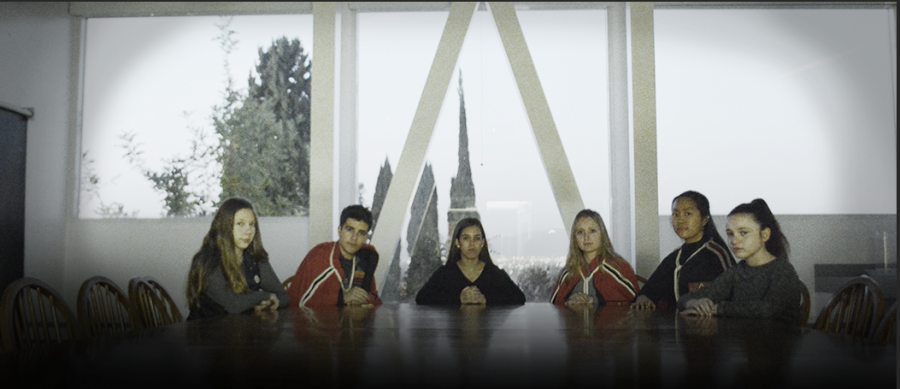When Chris* ’17 received an email from Chaplain J. Young requesting a meeting, his stomach dropped. He didn’t know why Young wanted to see him.
“I’d had an issue with my friend, who did not once try to contact me or talk to me about it or how to resolve it, then I get an email the next day from FJ saying ‘come talk to me,’” Chris said. “And now I have an Honor Board infraction.”
Chris had angrily “subtweeted” a friend after an argument, meaning he made a social media post complaining about the situation without identifying the friend. His friend, who felt hurt and targeted by the post, showed it to Young wishing to report it to the Honor Board. Chris said that Young asked him to meet to talk about the situation and warned him that the Honor Review Committee, a subset of the Honor Board consisting of generally three or four prefects, a dean and a few teachers, would be looking into the case to determine if it should go before the Honor Board.
In several instances, a case won’t make it past the HRC. Chris’ wasn’t one of those cases. Chris said, seemingly out of the blue, without being called in front of the Honor Board, he was called into a meeting where he was presented with a contract outlining the details of his punishment.
“The Honor Board created a list for me of rules I had to abide by,” Chris said. “It was like ‘The 95 Theses.’ It said, ‘you [and your friend] have to have mediated meetings,’ for example. I had to do all the things on the contract, and if I didn’t, I would be suspended from school.”
Although bullying cases like Chris’ are rather rare, Young said, they tend to be in more of a gray area since the Honor Code provision relating to it, “I won’t violate the person of others,” is broad. Cases in which a student potentially broke the law go directly to the administration and can sometimes result in police involvement. The most common cases, however, concern cheating, but Young said there is no set protocol for reporting and handling these cases before they reach him.
Only 39.5 percent of the 342 students who responded to a Chronicle poll said they feel they understand how the Honor Board works well enough. If a teacher notices a violation, they do not necessarily have to report it to Young.
“Many teachers, myself included, try to handle those [minor] things internally if we can, sharing the circumstances as much as needed with the dean,” math teacher Kent Nealis said. “It really, for me, would have to be something egregious and something where the student wasn’t very forthcoming [for me to take the case to the Honor Board].”
Alternatively, they could first contact the student’s dean to find out if it is the student’s first offense. If so, the teacher has the option to handle it internally. If not, the dean is supposed to report it directly to Young.
Science teacher Krista McClain said she views minor offenses as learning opportunities and handles them accordingly but still notifies the student’s dean.
“I feel like it’s a teaching lesson, and so I try to enter that as a teaching lesson to them,” McClain said. “I always try to tell the dean so that it’s on a record of some sort so that, if it keeps happening in lots of classes, the dean is aware of it.”
Students who witness an academic breach can report the violation to their teacher, dean, a prefect or an administrator. When reported to a teacher, the teacher still has the option of handling it internally. Deans, prefects and administrators will generally take the case straight to Young.
When a case is brought to Young, he brings it to the HRC, which is given the basic facts of the case without any names. The HRC investigates whether there is a clear violator and clear evidence of a violation and then decides if the case is in their jurisdiction. If so, the case moves on to the Honor Board.
When Chris was brought to the Honor Board for bullying a second time — the allegation which he said was grossly exaggerated — six of his friends were interviewed by the Honor Board to examine his character and verify his accuser’s claims. Chris said he did not get a chance to speak to the Honor Board and present his side of the story in either case.
“The administration did not listen to me,” Chris said. “[In my second case], they had already labeled me as a bully. They did not care what I had to say. They did not care what I felt. No one really listened to me or the friends who vouched for me.”
Chris said the Honor Board was “out to Honor-Board someone,” which blinded them from hearing his perspective. Since the investigation is done beforehand, the Honor Board serves as “more of a sentencing hearing,” said Charlie Noxon ’17, who was a sophomore and junior prefect and sat in on cases during the 2014-15 school year.
“The vast majority of cases in which the student is innocent is never brought to the Honor Board itself,” Noxon said. “In a way, I think that diminishes [its] power if the Honor Board’s role is not to determine if a student is innocent but is to determine how best to punish them. We’ve never had a ‘Twelve Angry Men’ moment in the Honor Board. No one has come in appearing to be guilty and, by the end, [been found] innocent.”
The student’s dean is meant to serve as emotional support, Upper School Dean Sharon Cuseo said, and walk the student through the process. Chris, however, said he did not feel supported by his dean, who did not say his name correctly when discussing the case with him and seemed to have already marked him as guilty.
Cuseo said that deans also help students deal with Honor Board infractions in terms of college admissions.
Infractions can negatively impact a student’s chances, but, she said, the longer it’s been since the infraction, the better it is for the student. Deans can help students explain to colleges the nature of the infraction and how they have learned from it and changed since then.
“[Applying to colleges] has been difficult because it goes on my record, and when colleges see an Honor Board infraction, they don’t really understand the circumstances,” Chris said. “However, I’ve had a teacher, dean and administrator who are writing letters to colleges saying ‘he’s not this type of person; this is a very one-sided story,’ in addition to my letters of recommendation to address the infraction.”
Some students who were previously involved with the Honor Board believe there is room for improvement when it comes to transparency.
“I don’t have a solution but that there are a lot of problems with the institution of the Honor Code, and the Honor Board here at Harvard-Westlake, and that transparency and confidentiality, are only a few of the many,” said Shelby Weiss ’16, who was a prefect in her sophomore, junior and senior years and sat in on Honor Board cases during that time.
Twenty-nine percent of students said they would be concerned about confidentiality if they were brought to the Honor Board. Some students said they heard about Honor Board cases they weren’t supposed to know about.
“I’ve heard prefects talking about the details and specifics of Honor Board,” said Aria* ’17, who requested to be anonymous so as not to face inquiry from the Honor Board. “I actually didn’t know they were supposed to be confidential, so I never knew they weren’t supposed to [talk about them].”
Young said that confidentiality is absolutely required for the teachers and prefects serving on the Honor Board and in the HRC. The accused and any accusers or third parties who were interviewed, however, are under no obligation to keep the case confidential but are nonetheless encouraged to.
“There are very, very serious consequences for [breaking confidentiality],” Head Prefect Cate Wolfen ’17 said. “Not only is it not a kind thing to do, but all prefects understand, and we reiterate all the time, that if you were to break confidentiality about an Honor Board case or other things, then your position on prefect council would be jeopardized.”
The Honor Board and Prefect Council used to be separate entities, but they were consolidated because of a large overlap between their responsibilities, Young said. The Honor Board has existed in its current setup for a long time, he said.
As a result, Noxon said, the Honor Board has seen enough cases at this point that, for each case they see, there probably has already been a similar one before upon which they can base current decisions.
Each case, however, is different, causing a conflict between the value of consistency and the desire to personalize each decision.
“We wouldn’t need an Honor Board if we said that every kind of academic integrity violation will always have the same result and any violation of our substance policies will have the same result,” President Rick Commons said. “We need an Honor Board so we can look at each individual case on the facts of that case. But then it’s a special challenge for that group to be consistent.”
Noxon said he feels that this is a “core issue” of the Honor Board process.
“I can think of three or four cases off the top of my head where we had thought of a less severe punishment, and [after] looking back on prior cases, it had been voted upon that a more severe one would be warranted to maintain consistency,” Noxon said. “The problem with precedent is assuming equivalency. Although cases may appear similar, when you get into the interviews, when you talk to the kids, they’re radically different from each other. The point of the Honor Board is not to punish; it’s to make sure the student can get back on their feet.”
Cuseo said that she wishes students would look at going to the Honor Board as an opportunity to improve themselves, not just as a mechanism for punishment.
“I believe so much in the redemptive power of going before the Honor Board and how important it is for students to have this experience in high school where they’re forced to take a look at themselves and their motivations and their patterns that, if my children were here, I would want [them]to go before the Honor Board,” Cuseo said.
*Names have been changed.



































